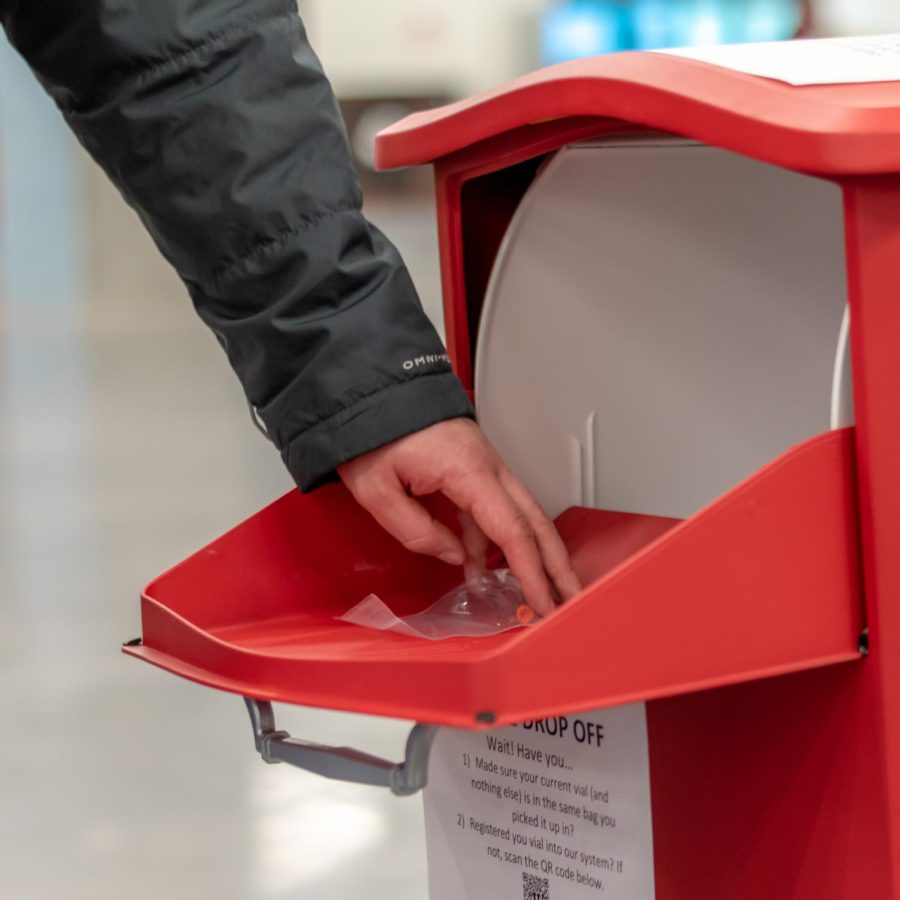U Vaccination Requirements Now Include COVID-19 Booster
A member of the U of U campus community deposits a Covid-19 self-test sample in a collection box inside of Kahlert Village on campus in Salt Lake City on Friday, Feb 4, 2022. (Photo by Jack Gambassi | The Daily Utah Chronicle)
February 4, 2022
In fall 2021, the University of Utah added the COVID-19 vaccine to their list of vaccination requirements and they have now also added the COVID-19 booster shot as well. The vaccination requirement is one of the precautions the U has implemented to fight against COVID-19.
“This is going off of the latest CDC and federal guidance on trying to keep COVID-19 numbers as low as possible, so that we can continue to have students, staff and faculty on our campus safe and healthy,” said Morgan Aguilar, a communications specialist for the U.
Students who do not meet the vaccination requirements or fill out an exemption will have a hold on registering for future classes. Students can request exemption from these vaccine requirements for personal, medical or religious reasons.
“Watch your University email account for detailed instructions,” said the Student Health Center website. “If you received all of your vaccinations in Utah, our office may be able to automatically confirm compliance with the requirements. If so, you will receive an additional email letting you know that you are fully compliant with the vaccination requirements.”
Students who have not received all of their shots in Utah will have to verify their vaccinations. Forms that will verify this include COVID-19 vaccination card records from a healthcare provider, among others.
“I want to be clear that fully vaccinated now means those two initial doses of Pfizer or Moderna, or the one initial dose of [Johnson and Johnson], plus a booster dose,” Aguilar said. “So even if you got J&J, you still have to get another one that’s going to be a booster. And the booster can be either Pfizer or Moderna.”
According to Johns Hopkins Medicine, booster shots do not have to be the same brand as the original vaccine dose someone got — people can “mix and match.”
“Vaccination at the personal or individual level protects people from severe disease, hospitalization and death,” said Teresa Garrett, an associate professor with the College of Nursing and an advisor on the campus COVID-19 emergency response team. “The vaccine has your immune system respond in very sophisticated ways so that you can fight off disease.”
The COVID-19 booster shot serves as a reinforcement or a reminder to a body on how to respond to the virus.
“It’s not unusual for us to need a booster shot of vaccination. It’s also not unusual for it to take two or three jabs in order to achieve immunity against that particular infection,” Garrett said. “Most of us don’t remember that we had three shots against measles, mumps and rubella. Every ten years we get a booster against tetanus and pertussis. Every year, we get a booster or an update to the flu vaccine.”
Other COVID-19 precautions at the U include free testing for the campus community and the contact tracing team, and weekly vaccination clinics.
“We have vaccine clinics every Thursday in the student union from 2-6 [p.m. MST],” Aguilar said. “You don’t need an appointment, you can just walk in. If you do want to do the appointment route, you can also schedule an appointment with Student Health.”
For more information and frequently asked questions, the U has information online.










John Hedberg • Feb 8, 2022 at 7:18 am
https://www.cdc.gov/nchs/nvss/vsrr/covid_weekly/index.htm#SexAndAge
This (see link above) is a chart by the CDC, outlining COVID mortality for Americans 18-29 over a 2 year period. On the same chart, it shows “deaths involving pneumonia” are only a little bit less than “deaths involving COVID-19”. Rochelle Walensky, the CDC Director, recently said that 75% of all national COVID-19 deaths involved people with at least four (4!) comorbidities, and the average age was above 70. In other words, people in the college age group who get COVID mostly aren’t aware of it, or they get a cold. Despite that, out of massive concern for safety despite the scientific data showing our age group isn’t really vulnerable, we all got the jab anyway, while data in the following chart (see link below) indicates that 84% of continental Africans haven’t even received a first dose yet.
https://ourworldindata.org/explorers/coronavirus-data-explorer?zoomToSelection=true&time=2020-01-23..latest&facet=none&hideControls=true&Metric=People+vaccinated+%28by+dose%29&Interval=New+per+day&Relative+to+Population=true&Color+by+test+positivity=false&country=USA~Africa
Now, we’re told that despite not being part of a vulnerable group, we must receive an additional needless shot while a billion people, many of whom are part of vulnerable groups, haven’t even had their first.
Where is logic or compassion, science or good human values in this decision? The cowardice seems absolutely shocking, and it’s coming to us from the same people who tell us how important equality and Love are. How about honesty? #GotLove?
All the Best, With Love,
J Hedberg
Kristen Hoppe • Feb 11, 2022 at 10:49 am
I appreciate your comments John. It has not been sitting right with me that a population group (Americans 18-29) that is at very low risk for developing serious illness, death, or hospitalization are being required to take the booster. Are we still following the science or politics? Does it make more sense to have equitable global distribution of vaccine? I am also concerned about the increasing censorship of individuals who bring up thoughtful dialogue surrounding the vaccine campaign. To be transparent I received my first 2 doses of the vaccine. After becoming quite ill after the second vaccine, and then acquiring a very mild case of Covid recently, I am reluctant to take the required booster. Thanks again for your comment.